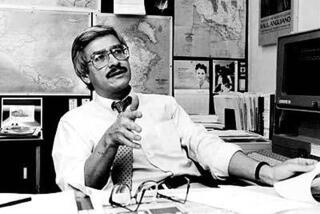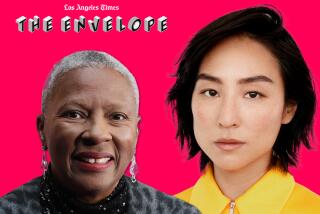Her Happiness Was Innate, Not Prescribed
- Share via
In the last week of July 2000, my vigorous 56-year-old wife, Lois, and her sister were completing a rugged backpacking hike through the Colorado Rockies. Lo, a sixth-grade teacher, returned home to Tustin still pumped, but with a nagging headache that she attributed to the altitude at which she had been for weeks.
When the headache persisted and she began to have a problem “finding the right word,” she went to our family doctor. Thinking Lo might have had a slight stroke, he ordered an MRI. He called us the next morning: Lo had a brain tumor, a glioblastoma multiforme. There was no cure.
Lo subsequently underwent radiation and two “debulking” procedures. The tumor could not be wholly removed because it was too entwined with vital parts of the brain, and surgeons worried about “quality of life” issues if the surgery was too aggressive.
After the first procedure, she was given only 90 days to live, and further treatment was not recommended. But 120 days later, she not only was alive but was walking, talking and looking forward to each day. The second debulking left her profoundly paralyzed, but again she began a slow progress toward recovering her abilities. Based on her progress, we asked for a third debulking, which isn’t unusual for brain tumor patients. But we faced resistance from doctors who again expressed concern about “quality of life” after surgery. Here’s what I wrote to Lo’s surgeon:
*
“Lo and I are completely cognizant of the risks of the surgery, and we know that the surgery alone won’t solve her problem. Of course, it’s impossible for us to know what Lo’s quality of life will be like for her even with the best-case scenario. But the perspective we have on quality of life is something we read long ago about happiness:
Happiness is the greatest paradox in nature ...
it can grow in any soil,
it can live under any conditions.
Happiness consists not of having
but of being,
not of possessing
but of enjoying.
A martyr at the stake can have happiness that a king on his throne might envy
Our shared view is that even if Lo has a crippled body after surgery, and even if she gains only a short amount of additional life, so long as physical pain is absent or can be controlled I know that because of the type of person she has always been and remains even now that she will find joy in the simple pleasures left to her, such as seeing our grandson play, having loving family around her or taking a wheelchair ride to see a sunset at the beach.
I love Lo too much to selfishly want to keep her merely alive awhile longer in a state of pain ... but judgment of quality of life cannot be made by any objective measurement. Life quality is something that only the person living the life can evaluate. Was Beethoven in anguish because he became deaf and was deprived of hearing any kind of music, let alone the wonderful music he composed? If he was, how could he have written such uplifting music? Is Stephen Hawking lacking in quality of life because his brilliant mind is caged in a twisted and paralyzed body that makes it impossible for him to even speak or care for himself? Where would modern astrophysics be without his continuing brilliant thinking about the nature of the universe? Even more unfathomable: Is an Alzheimer’s victim who cannot recognize his spouse and children leading a low-quality life? Perhaps that person is intensely happy in a world of wonderful memories free of the daily worries we all must deal with.
Absent constant severe pain, quality of life can only be determined by the person living the life. If Lo’s eyes light up for only 30 minutes a day while she observes her grandson at play, is that 30 minutes of lesser or greater value than the other 231/2 hours in her day? Happiness defies quantification.
I would never let Lo suffer. And only Lo and I can determine her quality of life. Not even our children know us well enough to make a determination.
Based on what I observe about Lo throughout each day, as well as from what I know about Lo from our 32 years of marriage, and from my deep love for her, I think that whatever prolongs her life without causing her constant pain will give her a quality life. She has already shown that through two surgeries and painful recuperation periods.”
In spite of my argument for the surgery, it was denied.
Lo never became depressed or anxious, even as she failed to improve and became less able to help herself. Nor did her outlook change when she had to rely on me for every need. Although she could no longer hold her grandson, Lo loved to have him crawl all over her bed, sit on her chest and touch her nose and lips with his curious little fingers. She smiled and laughed at his antics.
Each day, I read her stories, or we perused old photo albums, laughing over forgotten joys. Each day was a time of togetherness. Gradually, as June passed, Lo began to sleep more and more ... finally I could only coax her to consciousness when I would feed her.
During the final three days of her earthly life, Lo did not even awake for food or drink. Finally, on July 10, I sat down at Lo’s bedside, took her small, soft hand in mine, smoothed her hair and began to talk. I had no idea what I was going to say.
I recalled the good times we had, I told her that I knew how deeply she loved me and assured her how deeply I loved her .... I confessed she had been far more than just the wind beneath my wings--she was the eagle on whose back I had been and would continue to be carried. I spoke to my dear Lo of the wonderful job she had done raising our children to become fine adults .... I recalled many of the hundreds of students she had taught and who had visited her or sent her cards telling her of the influence she had on their lives ....
I told my dear Lo that although I would desperately miss her soft kiss and touch, the scent of her hair, her quiet breathing at night, I knew that she would remain alive and with me .... I told her to look up and see God standing in the gates of heaven, arms wide, waiting to embrace her.
As I spoke, her breathing that had been labored for days became smooth and regular ... and grew ever more shallow ... I gently squeezed her hand
Quality of life? Think of the martyr in the dungeon and the king in the throne: Who can say which person has the greater quality of life?
*
John Rossmann is a sixth-grade teacher in Orange Unified School District.


